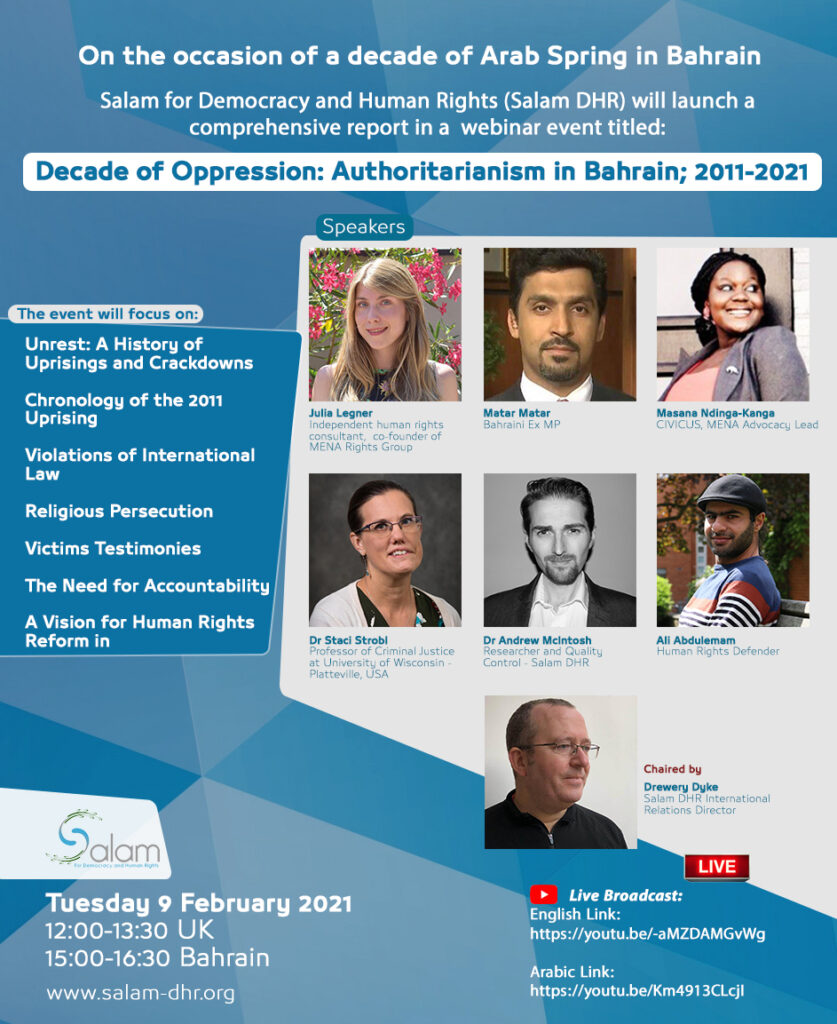Beirut / London – 6 February 2021
For immediate release
Media advisory / press statement
Report launch: Bahrain – Pillars of democracy and human rights: the only way to address pervasive torture, violence and oppression of the last decade
Date: Tuesday, 9 February 2021
Time: 12:00-13:30 UK / 15:00-16:30 Bahrain
Format: online interactive seminar, with live, English feed at https://www.youtube.com/watch?v=-aMZDAMGvWg and Arabic https://www.youtu.be/Km4913CLcjI, featuring Drewery Dyke, Chair, Rights Realisation Centre, in conversation with:Dr Andrew McIntosh – SALAM DHR researcher and quality control, report author and editor, to present the report and its findings;
Ali Abdulemam – Bahraini activist and blogger, reflecting on events in 2011;
Matar Ebrahim Matar – former member of parliament with now banned, leading opposition party, Al-Wefaq, the opposition party in Bahrain, on looking forward;
Julia Legner, human rights expert, on the wider and enduring impact of the 2011 unrest and questions of accountability
Staci Strobl, Professor of Criminal Justice, University of Wisconsin Platteville, assessing events in 2011 in respect to a century of repression, and
Masana Ndinga-Kanga, CIVICUS, MENA Advocacy Lead and Crisis Response Fund Lead, on the global impact of the unrest in 2011 and whether a global experience can shape Bahraini discourseThere will be 20-30 minutes for discussion.
To arrange an exclusive interview with the panelists, contact Drewery Dyke on +447800989221
Bahrain – Pillars of human rights and democracy: the only way to address pervasive torture, violence and oppression of the last decade
Wholesale political reform with human rights and people’s sovereignty at its core can unlock the sustainable development that the people of Bahrain need
The landmark Salam for Democracy and Human Rights (SALAM DHR) report, Decade of Oppression: Authoritarianism in Bahrain, 2011-2021 documents Bahrain’s decade of authoritarian practices and a catalogue of human rights abuses.
Reflecting on the report’s conclusions and recommendations, Jawad Fairooz, President of SALAM DHR, said, “Wholesale political reform with human rights and people’s sovereignty at its core can unlock the sustainable development that the people of Bahrain need,” adding that, “Bahrain has the means to engage in comprehensive human rights reform, but do the governing networks have the will?”
This comprehensive report, in over 50 seperate sections, reviews historical precedents, provides a chronology of events in 2011 then examines the findings of the Bahrain Independent Commission of Inquiry (BICI). It explores how the government asserted that it fulfilled the BICI recommendations, yet how it avoided reform in regards fundamental civil and political as well as economic, social and cultural rights.
The report decries that fact that in the course of the decade, the government quietly dropped cases against officials accused of violating the rights of Bahrainis, that this absence of accountability mirrors the government’s inability or unwillingness to provide closure to those whose loved ones were killed, injured or whom the government arbitrarily detained, many of who remain unfairly incarcerated to this day. The government’s wrongful use of the death penalty, its deployment of torture and arbitrary stripping of citizenship likewise exemplify the gaping, unhealed wound at the heart of society.
The report finds that key practices used by the authorities to maintain its repressive posture also includes:
- Government assertions to international partners that it respects international human rights norms when, in fact, freedom of speech remains as scrutinised and restricted as prior to 2011; that freedom of assembly and association is likewise virtually non-existent, as shown by the closure by the government of all independent media and political bodies deemed unsupportive, the thorough scrutiny of social media as well as the banning of political leaders from standing in election for politically-motivated reasons inconsistent with international human rights standards;
- The deployment of spyware in order to automatise the systematic harassment and silencing of dissidents and human rights defenders;
- The instrumentalisation of nationality as a right-of-rights, arbitrarily withdrawing it in order to silence and banish opposition figures and dissidents as a quasi-feudal practice diametrically opposed the UN standards and more in keeping with unaccountable authoritarianism than a constitutional monarchy;
- The securitisation and atomisation of society, including in respect to religion, religious identity and expression, heightening divisive sectarianism across communities and society while accruing wealth and power to the Sunni minority, including the ruling family and
- The express refusal to hold officials accountable for violations despite the staccato news headline or announcement, which cannot be followed up with any transparency.
The report decries stubborn international support for the government, notably by the United Kingdom and United States of America, despite occasional, superficial half-condemnations that undermine international human rights standards and the principle of universality of human rights standards.
Jawad Fairooz concluded,”We urge the Biden administration and Secretary of State Antony Blinken to open a new chapter in relations with Bahrain. If Joe Biden’s call for unity at home is to be translated abroad, it means taking concrete steps to advance justice in Bahrain, and with it, social-political inclusion that can serve as the basis for security and sustainable development. The status quo will only lead us to 2011 all over again.”
—
For more information:
President – Jawad Fairooz @JawadFairooz (English and Arabic) +447449926577
Authors – Dr Andrew Mcintosh (English) +447801256685, Abbas Taleb @abbastalebb (French, Arabic, English) +31617679486
Spokesperson – Drewery Dyke @drewerydyke (English, French) +44780989221


 العربية
العربية Français
Français Deutsch
Deutsch